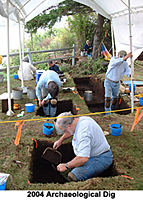DACF Home → Bureaus & Programs → Bureau of Parks and Lands → Discover History & Explore Nature → History & Historic Sites → Popham Colony
The Popham Colony of 1607
 This
model recreation, a gravel parking lot, and a large collection
of artifacts are all that remain of an English colony established
in 1607 in Phippsburg, Maine. The Popham Colony was the first
organized attempt by the English to establish a colony on
the shores of what we now know as New England. It was planted
at the mouth of the Kennebec River in the summer of 1607 and
lasted for little over a year until it was abandoned in the
fall of 1608. To return home to England, the colonists constructed
the first ship ever built in North
America.
This
model recreation, a gravel parking lot, and a large collection
of artifacts are all that remain of an English colony established
in 1607 in Phippsburg, Maine. The Popham Colony was the first
organized attempt by the English to establish a colony on
the shores of what we now know as New England. It was planted
at the mouth of the Kennebec River in the summer of 1607 and
lasted for little over a year until it was abandoned in the
fall of 1608. To return home to England, the colonists constructed
the first ship ever built in North
America.
 Popham
was not the first European colony in New England. The French
were earlier with a brief settlement on an island in the St.
Croix River further up the Maine coast in 1604. Although
Popham was the first claim of possession of what was then
called Northern Virginia by the English, the honor of the
actual founding of a "New" England belongs to the
Pilgrims who established the first permanent settlement
in Massachusetts Bay thirteen years later. Despite its precedence,
the failure of the Popham Colony to endure has rendered it
a nearly forgotten historical footnote. Its failure, however,
was an important step in the ongoing experience of English
colonization and the lessons learned contributed directly
to the ultimate success of the Pilgrims.
Popham
was not the first European colony in New England. The French
were earlier with a brief settlement on an island in the St.
Croix River further up the Maine coast in 1604. Although
Popham was the first claim of possession of what was then
called Northern Virginia by the English, the honor of the
actual founding of a "New" England belongs to the
Pilgrims who established the first permanent settlement
in Massachusetts Bay thirteen years later. Despite its precedence,
the failure of the Popham Colony to endure has rendered it
a nearly forgotten historical footnote. Its failure, however,
was an important step in the ongoing experience of English
colonization and the lessons learned contributed directly
to the ultimate success of the Pilgrims.